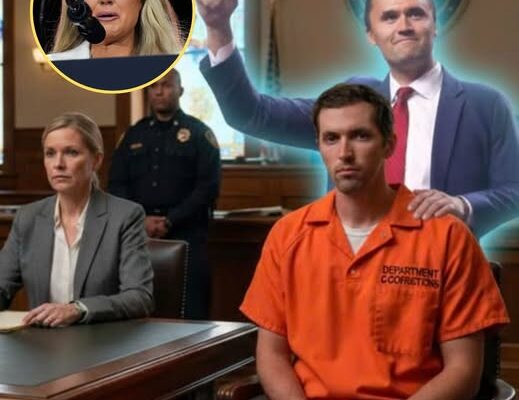For months, the nation has asked one question: What really happened to Charlie Kirk? Today, they got their answer, and it was devastating. Erika Kirk’s unbearable grief was on full display as the young defendant finally broke his silence.
Posted by

A Washington, Utah, courtroom, tense with months of unresolved grief and simmering speculation, descended into raw, unbearable emotion just hours ago. The stoic composure of Erika Kirk, a woman who has sat silently through weeks of agonizing testimony, finally fractured. Her body collapsed in tears as the man accused of ending her husband’s life, 22-year-old Tyler Robinson, delivered the confession the nation had been waiting for.
In a voice trembling with the weight of his admission, Robinson admitted to the shooting of conservative leader Charlie Kirk.
But it was his next words—a revelation that cut through the noise of political theories and media conjecture—that left the entire gallery frozen in a moment of collective, stunned silence.
After months of robotic “not guilty” pleas and a defense built on casting doubt, Robinson’s own lawyer looked stunned as the young defendant, pale and shaking, asked to address the court directly. The judge, sensing the shift, cautiously allowed it.
“It wasn’t supposed to happen,” Robinson began, his voice barely a whisper, yet it carried across the hushed chamber. “It wasn’t… it wasn’t political.”
This was the detail that stopped every heart. For months, the narrative surrounding Kirk’s tragic end was dominated by his high-profile status. The prevailing theory was that this was a political act, an extremist lashing out at a figurehead.
Robinson’s confession painted a different, and perhaps more haunting, picture. He revealed a personal connection to the Kirk family, one that had been kept from the public and, it seemed, from his own defense team. He described a private dispute, a festering misunderstanding that had escalated. The shooting, he claimed, was the catastrophic, panicked result of a confrontation gone terribly wrong.
“I just wanted him to listen,” Robinson stated, his words choking him as he refused to meet Erika Kirk’s eyes. “I brought… I brought it to scare him. I never… I never meant to…”
The courtroom atmosphere, which reporters had described as “electric” with tension, instantly imploded. Erika’s sob was a visceral, human sound that broke the stunned silence. It was the sound of a truth finally delivered, but a truth that offered no comfort. It was the sound of a nightmare confirmed.
The judge immediately called for a recess. As officers moved toward Robinson, Erika Kirk was helped from her seat by family members, her grief a tangible presence in the room. Witnesses described the scene as one of complete disbelief. Jurors looked visibly shaken, their faces pale. Reporters, hardened to courtroom drama, scrambled for the exits, their hands trembling as they relayed the update.
This was the moment the trial pivoted. It was no longer a “whodunit” or a political mystery. It became a human tragedy, stark and senseless.
For Erika Kirk, this journey has been a public crucible. She has been a fixture in the courtroom’s front row, a silent testament to the man she lost. Her strength, as described by those close to her, has been rooted in a single, desperate need: not for vengeance, but for truth. While the world debated conspiracies, she was waiting for an answer to the simple, agonizing question of why.
Today, she received that answer. The truth was not a grand political plot, but a personal, messy, and devastatingly human failure. The confession provides a path to legal closure, but it rips open a different kindautoof wound.
The enigma of Tyler Robinson has also been solved. Until today, he was a cipher. At 22, the local man had no significant criminal record and no known ties to extremist groups. His apparent lack of motive is what fueled the rampant speculation that he was a pawn in a larger game.
Now, he is revealed as a young man destroyed by his own choices, entangled in a personal conflict that spiraled into an irreversible tragedy. His defense, which had been methodically attempting to build a case of mistaken identity and reasonable doubt, is now in ashes, undone by the defendant himself.
Remembering Charlie Kirk, the man at the center of this tragedy, his loss is now cast in a new light. A towering figure in conservative circles, Kirk was a voice that galvanized millions. His commentary was sharp, his following loyal, and his presence undeniable. His sudden passing stunned the nation, leaving a profound vacuum in the political discourse.
The incident itself, just over six months ago, happened on a quiet evening outside a community center where Kirk had just finished a town hall meeting. The suddenness and violence of the act, combined with Kirk’s status, immediately sent shockwaves across the country. The investigation was fraught with immense pressure, and Robinson’s arrest weeks later did little to quiet the “why” that echoed from coast to coast.
The trial has been the biggest event in Washington, Utah’s recent history. The prosecution had built a careful, circumstantial case, while the defense chipped away at timelines and police procedures. The public watched, largely convinced of a political motive, waiting for the “smoking gun” that would reveal a conspiracy.
Today, Tyler Robinson became the prosecution’s star witness, and the “smoking gun” was his own conscience.
The local community remains in shock. This confession doesn’t feel like a victory. It clarifies the tragedy, removing the political layer to expose the raw grief beneath. Social media, once a hotbed of conspiracy, has shifted to a tone of profound sorrow and disbelief. The revelation that this was a personal dispute, not an ideological war, makes the loss feel, to many, even more senseless.
For millions following this case, today marks a definitive, heartbreaking turning point. The speculation is over. The “what” and “why” have been laid bare in the most dramatic way possible.
Legally, the case now moves toward an inevitable sentencing. But for Erika Kirk and all who knew Charlie Kirk, the journey is far from over. The truth, finally brought into the light, is heavy and hard. But as one observer leaving the courthouse remarked, “At least now, the long, painful process of understanding can finally begin.”



